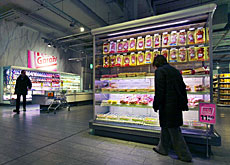Supermarket price war set to intensify

The arrival of a second German discount supermarket chain this year should finally signal the end of inflated prices for Swiss consumers, according to a retail expert.
Swiss supermarkets are slashing prices in anticipation of Lidl opening its first store in March. With German rival Aldi already present in Switzerland, suppliers will feel more pressure to lower costs.
Switzerland’s second largest chain, Coop, landed the first blow in the renewed price offensive last week by reducing the cost of 600 products. Manor has responded in kind with market leader Migros also posting special offers.
Consumers will be familiar with the wave of eye-catching reductions that started to feature just before Aldi gained a Swiss foothold in 2005. Prices have sunk ten per cent in recent years, according to Reiner Eichenberger, a retail expert and professor at Fribourg University.
But Eichenberger expects the emergence of a second low-cost German rival to set the fuse burning faster than ever before.
“The two big lions, Migros and Coop, opened an eye when one smaller lion arrived [Aldi]. But when there are two small lions fighting in the market then the big ones will awaken,” he told swissinfo.
Feeling the heat
Switzerland’s reputation as a high-price island forces many consumers over the border to do their shopping in cheaper countries. Swiss prices were 40 per cent higher than in German stores before Aldi arrived, and consumers still pay a third more, according to Eichenberger.
“Switzerland is a smaller market with an emphasis on quality rather than price, so suppliers have been able to differentiate with the cost of their goods,” he said.
“The biggest reason for such a price differential was the lack of competition in the Swiss market. Migros and Coop were in a state of equilibrium so had no incentive to engage in a price war. But the gap between the two countries should now be reduced considerably.”
Aldi and Lidl are market leaders in Germany with huge financial resources and can bring greater pressure to bear on suppliers, such as Nestlé and Unilever, to bring down their prices.
“Lidl, in particular, sells many well known brands and buys them from all over Europe, so they could force manufacturers to rethink their pricing structure in Switzerland,” Professor Thomas Rudolph, a marketing expert from St Gallen University, told swissinfo.
All can survive
However, Rudolph believes it would be counter-productive for Migros and Coop to engage in a long-term price war. A report last year from the university said that the spate of price reductions were failing to bring in any new customers to Swiss supermarkets and could result in job cuts.
“In the short term it could be quite helpful for the Swiss supermarkets to try to convince their customers that their prices are competitive compared with the discounters,” he said “But in the long run, they should put more emphasis on better service, quality or the convenience of their store lay-out.”
Both Eichenberger and Rudolph agreed that the market would become tighter with the arrival of Lidl. But both also believe that all the main players could avoid the fate of French chain Carrefour, that pulled out of Switzerland in 2007, and survive in the same market.
swissinfo, Matthew Allen
Migros and Coop have for years dominated the Swiss supermarket scene, carving up nearly a third of the market share – rising to 70% in the food and drinks sector.
Prices have remained so high in part to the reluctance of Swiss consumers to value cost over quality. Discount supermarkets (the largest being Denner) make up only 5% of the market compared with 40% in Germany, according to a recent report.
But that is set to change with the arrival of Germany’s second big discount chain, Lidl, to complement its established rival, Aldi.
Aldi touched down in Switzerland in October 2005 and had some 80 Swiss stores by the end of 2008 – a market share of roughly 1%.
By the end of 2010 both Aldi and Lidl chains are expected to operate 220 stores, seizing 5% market share, according to recent research by Credit Suisse.
The arrival of German rivals also sparked a consolidation of the supermarket retail sector in Switzerland. In 2007, Migros got the green light to take over Denner while Coop targeted the stores left behind by the departing Carrefour and electronics chain Fust.

In compliance with the JTI standards
More: SWI swissinfo.ch certified by the Journalism Trust Initiative












You can find an overview of ongoing debates with our journalists here . Please join us!
If you want to start a conversation about a topic raised in this article or want to report factual errors, email us at english@swissinfo.ch.